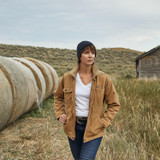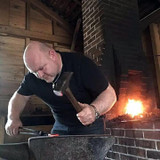AS IT SHOULD BE
When successful Chicago lawyer Matt Skoglund traded his job and all he’d known for the rural grasslands of the Shields Valley in Wilsall, Montana, he left more than a few naysayers in his wake. But Skoglund and his wife, Sarah, were following threads more deeply woven into the fabric of humanity than modern man might like to admit: the transience of a life well-lived.
Born and raised in suburban Chicago, Skoglund spent an active childhood engaged in sports and outdoor pursuits with his brothers. As a young teenager, he completed a National Outdoor Leadership School (NOLS) wilderness immersion course in Idaho, nurturing a love for fly fishing and wide open spaces. A lifelong hockey enthusiast, he attended a New England boarding school to hone his skills and, upon graduation, attended Middlebury College, where he continued to play throughout his undergraduate degree. Multiple trips to Montana during and after college planted seeds for future endeavors, but, at the time, Skoglund was intent on other pursuits. He obtained his law degree from the University of Illinois in 2005, and immediately began work clerking for a federal magistrate judge in Chicago. He soon joined the litigation team at a large law firm in the city and all was as it should be.
“We all have to eat. And, if we’re lucky, we get to eat three meals a day. You factor that out across billions of people, and you quickly realize that eating has an enormous impact on the planet. So, if we can produce food that is truly regenerative – that in our own tiny way makes the world a better place – we are having a positive impact that we can feel good about.” - Matt Skoglund
Except, it wasn’t. Something as undeniable and intuitive as the need for sustenance and sleep – ironically, in fact, those exact concerns — was nagging at the couple’s periphery. They wanted to be present with nature, to live somewhere that brought wild terrain to their backdoor, that reconnected them with the earth, their food supply, and the sustaining circle that connects it all. They wanted to “raise a bird dog” and, eventually, to rear children that knew the splendor of muddy toes and mountains. “I was wildly in love with Montana,” says Matt, “and Sarah was excited for the change.” So, in 2008, Sarah and Matt made their move.
The years since have held their share of surprises, but none so indelible as the intimate connection they now share with the land and the animals they’ve reintroduced to it. In 2018, Matt and Sarah started North Bridger Bison, a holistically managed, regenerative agriculture informed ranch that is reestablishing a growing population of bison on the great plains, reinvigorating soils with the biodiversity intrinsic to the natural grazing patterns of this critical keystone species, and providing humanely field-harvested bison meat to like-minded customers nationwide. In honoring nature and the animals they raise, the Skoglunds do their part to impact a food system that has long been out of balance. “We all have to eat. And, if we’re lucky, we get to eat three meals a day. You factor that out across billions of people, and you quickly realize that eating has an enormous impact on the planet,” remarks Matt. “So, if we can produce food that is truly regenerative – that in our own tiny way makes the world a better place – we are having a positive impact that we can feel good about.”
“Life at the ranch is pretty simple,” Matt says with a smile. “Nature is in charge here.” And the Skoglunds wouldn’t have it any other way. As they raise their children, Otto and Greta, knee deep in all that Montana has to offer, they find themselves more irrevocably in love with their surroundings each year. “From the first bison calves born in April and the return of songbirds to the heat and dry weather of summer to the resplendent fall colors — feeling the sun and its light differently depending on the time of year — to the first snowfall and shocking cold snaps: we are just so much more connected to the cyclical rhythm of nature and the seasons,” says Matt.
They are as awed as they are humbled by their presence as both observers and stewards of the land and its creatures. Working with nature, as opposed to attempting to manipulate and control it, has informed a perspective as much about ranching as life in general. In the scheme of things, we are just another species intent on survival and have no greater sway over that outcome than the smallest or largest among us. “I don’t know how you could do this work and not find a beautiful and simple humility in all of it.”
Featured Favorites
-

-

Detailed Cicada Pendant Necklace with Diamond Eyes, Sterling Silver
ET-WS-AC-CicadaPendantSterling
€704.49 -

-



 US Dollars (USD)
US Dollars (USD)
 British Pound (GBP)
British Pound (GBP)








